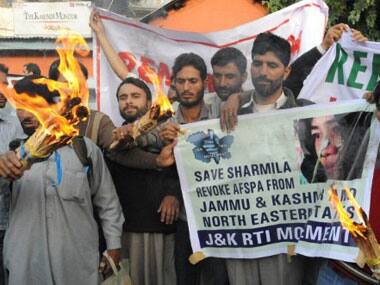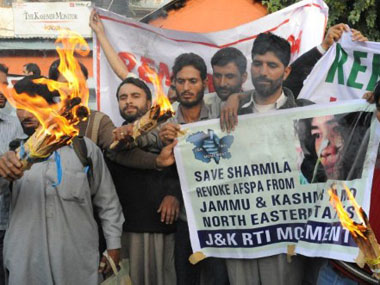A career in the armed services is unlike any other, for the simple reason that much more is asked of our men in uniform than of anyone else. The worst occupational hazard that a journalist, for instance, faces is that he will be hounded by those who disagree with him. But with Army officers and soldiers, the nation calls upon them to, in the worst case, lay down their lives – and not just in wartime either. As the recent instance of the beheading of an Indian soldier by Pakistani soldiers at a time of notional peace (despite the tension along the Line of Control) revealed, soldiers and officers pay with their lives for the ‘honour’ of defending their country. [caption id=“attachment_617366” align=“alignleft” width=“380”]  Protests against AFSPA: PTI[/caption] It also goes without saying that a nation’s security impinges heavily on the level of morale within the services. A demoralised, ill-equipped or inadequately trained army enfeebles the core of a country’s security, which is one reason why defence allocations are seldom questioned or subjected to rigorous scrutiny even at the risk of tolerating corruption in arms acquisitions. For all these reasons, making or amending laws that relate to, or impinge on the services requires considerable application of mind, and imposes upon a civilian government the requirement of securing the services’ consent on anything that might be seen to be impacting morale in the services. In the context of the Justice JS Verma Committee’s recommendations (on amendments to criminal law, in the context of the recent gang-rape in Delhi), this has placed the UPA government in a bit of spot. In particular, the Committee had noted that “there is an imminent need to review the continuance of AFSPA (Armed Forces Special Powers Act) and AFSPA-like legal protocols in internal conflict areas as soon as possible.” The Committee had claimed that AFSPA, which is in force in many border areas of the country that have been declared “disturbed”, effectively legitimized “impunity for systematic or isolated sexual violence in the process of internal security duties.” Women in conflict areas, it added, were entitled to “all the security and dignity that is afforded to citizens in any other part of our country.” As a signatory to the International Convention for the Protection of All Persons from Enforced Disappearances, India must put in place “strong measures” to ensure that such security and dignity will go a long way not only to provide women in conflict areas their entitlements, but also to restore confidence in the administration in such areas, it added. In that context, the Committee specifically recommended that sexual violence against women by members of the armed forces or uniformed personnel must be brought under the purview of ordinary criminal law. It additionally recommended “special care” to ensure the safety of women who are complainants and witnesses in cases of sexual assault by armed personnel. The ordinance that the UPA government promulgated over the weekend, which gave effect to some of the amendments in the criminal law as recommended by the committee in cases of sexual violence, did not touch upon this controversial aspect. For that reason, it had come in for criticism from activists who have for long been campaigning on behalf of victims of sexual violence by armed services personnel in conflict zones. On Wednesday, Finance Minister P Chidambaram sought to address that criticism. He said that the government was in favour of making the AFSPA a more “humanitarian law”, but that it could not do anything on that front in the absence of a consensus with the Army over the issue. The Army, said Chidambaram, had taken a “strong stand against any dilution” of AFSPA. “We can’t move forward because there is no consensus. The present and former Army Chiefs have taken a strong position that the Act should not be amended… They also do not want the government notification (of bringing areas under the AFSPA) to be taken back.” In such a situation, Chidambaram wondered, “how does the government move forward…to make the AFSPA a more humanitarian law?” It is easy to empathise with the government’s dilemma on this matter. Of course, the army functions under the command of the civilian government of the day, but on matter so delicate as this, which directly impacts on morale in the services, there is a compelling case to secure the services’ consent. It is nobody’s case that the armed services willfully protect and shield their soldiers when allegations of sexual violence are made. There is a due process of court martial, and there have been several instances of service personnel being dishonourably discharged when such allegations have been proved. It is also true that there have occasionally been instances when soldiers have been falsely accused of rape or sexual assault as an instrument of propaganda. But given the many high-visibility instances of egregious instances of the rape (and, in some cases, murder) of women in Manipur and other conflict zones, in which due process of justice has evaded the victims or their families for years, there is a case to be made for the armed forces to begin to show some flexibility on doing away with immunity under the Act to soldiers accused of sexual violence. It is an uncomfortable truth, one that it is wrong to ignore, that even the best trained armies occasionally inflict unspeakable horrors on civilian populations in conflict zones, and use rape as an instrument of ‘war’. The crimes are doubly horrific when they are inflicted on one’s own citizens, as has been the case in some of India’s border zones. As the Verma Committee rightly observed, this has enormous consequences. “The brutalities of the armed forces faced by residents in the border areas have led to a deep disenchantment, and the lack of mainstreaming of such persons into civil society,” it noted. “Serious allegations of persistent sexual assault on the women in such areas and conflict areas are causing more alienation.” Rather than digging in their heels and refusing to contemplate any amendments to AFSPA on the ground that they would impair morale and impact the efficacy of their operations in conflict zones, the armed services should perhaps yield some reasonable ground, and repose faith in the civilian criminal law – in cases of alleged sexual violence by service personnel. For all the special responsibility that is placed on them, armies serve themselves when they hold themselves to widely accepted standards of propriety and scrutiny. The Verma Committee’s report rightly shines a torchlight on a hitherto-neglected area that causes disquiet. Even if its recommendations are maximalist, the armed services will only dignify themselves by yielding some ground on this admittedly contentious issue.
For all the special responsibility that is placed on the armed services, they serve themselves when they hold themselves to widely accepted standards of propriety and scrutiny.
Venky Vembu attained his first Fifteen Minutes of Fame in 1984, on the threshold of his career, when paparazzi pictures of him with Maneka Gandhi were splashed in the world media under the mischievous tag ‘International Affairs’. But that’s a story he’s saving up for his memoirs… Over 25 years, Venky worked in The Indian Express, Frontline newsmagazine, Outlook Money and DNA, before joining FirstPost ahead of its launch. Additionally, he has been published, at various times, in, among other publications, The Times of India, Hindustan Times, Outlook, and Outlook Traveller. see more


)

)
)
)
)
)
)
)
)



